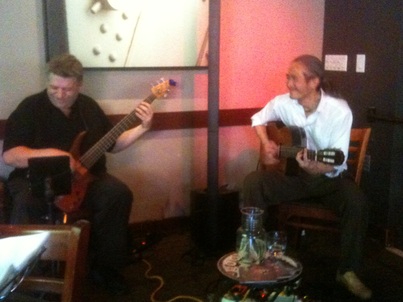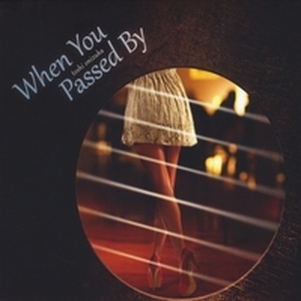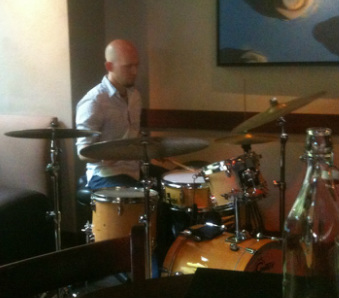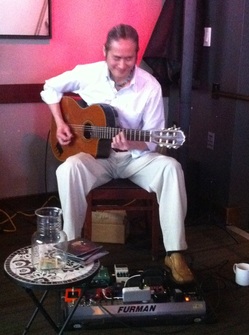
Jon Hughes and Toshi Onizuka
Sunday afternoon was the hottest day of the year, so far. As warm as it was outside, the stage where Toshi Onizuka's Trio were performing was a few degrees hotter that the rest of the place. And the music, of course, was scorching...
Never, ever predictable, Toshi, Reinhardt and Jon carved out new footholds on many of jazz and bossa nova's standards and gave fresh insight and inspiration into some of Toshi's original compositions. Some pieces received the energy and emotions from the trio while others were simply turned upside down.
The afternoon opened with Go With the Flow which is a Toshi Onizuka original and not to be confused with the Queens of the Stone Age song of the same name.
It was an inspiring and cheerful opening; perfect for a warm late-spring day. There was a touch of melancholy throughout the number but the liveliness of Toshi's Spanish guitar and the bounce of Jon Hughes' bass were accentuated by Reinhardt's abandonment of the sticks in favor of the finger-tapping on the drums. There was already a feeling expressed that this was not going to be just another Sunday afternoon at the Paragon.
Moliendo Cafe followed soon after with another summery feeling to it. This was composed in 1958 by Hugo Blanco. Blanco was 18 years old at the time of the writing. In 1961, the song went to Number One in Argentina and Japan. Blanco's uncle later claimed that he had written the song and sued his nephew. But the song continued to enjoy success in Peru and Spain and was even made into a massive hit in 1990 by Indonesian artist Kopi Dangut.
The song's hot, quick guitar was contrasted by the slow, cool bass from Jon. Toshi's guiro imitation accompanied Reinhardt's drum solo which was a low-end solo with little or no cymbals. It was an impressive display of almost tribal motifs. Oh, so today was going to be a study in opposites...
From the rumble and dash of Moliendo Cafe, Toshi led the trio into Una Carta De Amor. This is an orginal piece by Toshi and plays like a song of remembrance. There are charming chord changes and a captivating melody that switches to a samba near the end. At the song's conclusion, Jon asked what the title meant. Toshi answered that it is translated as "A Love Letter" while Reinhardt replied that it meant "I Hate You." The opposites continue.
Follow the link below to Toshi's performance of Una Carta de Amor.
Never, ever predictable, Toshi, Reinhardt and Jon carved out new footholds on many of jazz and bossa nova's standards and gave fresh insight and inspiration into some of Toshi's original compositions. Some pieces received the energy and emotions from the trio while others were simply turned upside down.
The afternoon opened with Go With the Flow which is a Toshi Onizuka original and not to be confused with the Queens of the Stone Age song of the same name.
It was an inspiring and cheerful opening; perfect for a warm late-spring day. There was a touch of melancholy throughout the number but the liveliness of Toshi's Spanish guitar and the bounce of Jon Hughes' bass were accentuated by Reinhardt's abandonment of the sticks in favor of the finger-tapping on the drums. There was already a feeling expressed that this was not going to be just another Sunday afternoon at the Paragon.
Moliendo Cafe followed soon after with another summery feeling to it. This was composed in 1958 by Hugo Blanco. Blanco was 18 years old at the time of the writing. In 1961, the song went to Number One in Argentina and Japan. Blanco's uncle later claimed that he had written the song and sued his nephew. But the song continued to enjoy success in Peru and Spain and was even made into a massive hit in 1990 by Indonesian artist Kopi Dangut.
The song's hot, quick guitar was contrasted by the slow, cool bass from Jon. Toshi's guiro imitation accompanied Reinhardt's drum solo which was a low-end solo with little or no cymbals. It was an impressive display of almost tribal motifs. Oh, so today was going to be a study in opposites...
From the rumble and dash of Moliendo Cafe, Toshi led the trio into Una Carta De Amor. This is an orginal piece by Toshi and plays like a song of remembrance. There are charming chord changes and a captivating melody that switches to a samba near the end. At the song's conclusion, Jon asked what the title meant. Toshi answered that it is translated as "A Love Letter" while Reinhardt replied that it meant "I Hate You." The opposites continue.
Follow the link below to Toshi's performance of Una Carta de Amor.
Black Orpheus is a film score from the 1959 film of the same name. It is the retelling of the Greek myth of Orpheus and Eurydice but is set in modern day Rio de Janeiro during Carnival. It is a strange but fascinating story and the music is enthralling.
As the trio plays it, the song takes on a nobility rarely seen. Jon's bass jumps alongside Reinhardt's steady rhythm. Toshi adds palmas to Reinhardt's percussion and Jon goes from bounce to glide and back to bounce. Toshi creates a feeling of attraction and affection that draws the listener in closer and closer.
In the film, two children follow Orpheus (Orfeo) throughout the movie believing that his guitar playing causes the sun to rise. The way Toshi plays, he could be Orpheus.
After the first break, the trio returned with Hypocrisy, another Toshi original. Despite the title, or maybe in fulfillment of the title, Hypocrisy is a sweet melody and is contrasted with a running bass line. Jon's short solo was engaging but opposite the melodic line. His solo was very appreciated by the audience and received heart-felt applause. The loveliness of the theme almost created a sense of something a little too smooth, almost slick. The title works. Opposites, again.
Another sweet but melancholy theme was to be found in Difficult Flower. The use of minors created a mood of weariness as Jon's thumbing on the bass had a nice effect. Reinhardt's drumming was pronounced and accentuated the mood. As Reinhardt manipulated the rhythm, Toshi's adventurous guitar coupled with him to create an almost Steppenwolf effect before sweeping back to the sweet melody.
As the trio plays it, the song takes on a nobility rarely seen. Jon's bass jumps alongside Reinhardt's steady rhythm. Toshi adds palmas to Reinhardt's percussion and Jon goes from bounce to glide and back to bounce. Toshi creates a feeling of attraction and affection that draws the listener in closer and closer.
In the film, two children follow Orpheus (Orfeo) throughout the movie believing that his guitar playing causes the sun to rise. The way Toshi plays, he could be Orpheus.
After the first break, the trio returned with Hypocrisy, another Toshi original. Despite the title, or maybe in fulfillment of the title, Hypocrisy is a sweet melody and is contrasted with a running bass line. Jon's short solo was engaging but opposite the melodic line. His solo was very appreciated by the audience and received heart-felt applause. The loveliness of the theme almost created a sense of something a little too smooth, almost slick. The title works. Opposites, again.
Another sweet but melancholy theme was to be found in Difficult Flower. The use of minors created a mood of weariness as Jon's thumbing on the bass had a nice effect. Reinhardt's drumming was pronounced and accentuated the mood. As Reinhardt manipulated the rhythm, Toshi's adventurous guitar coupled with him to create an almost Steppenwolf effect before sweeping back to the sweet melody.

Toshi's ripping arpeggios highlighted Blue Eyes, while Reinhardt kept up a bossa beat alongside Jon's sprinting bass. This interplay continued throughout When You Passed By. This is the title track of Toshi's latest CD whose cover art leaves men asking who is the woman on the front cover.
The answer is: no one seems to know. Although Toshi once said it was his mother.
The art work was provided by Toshi's graphic artist who has access to a library of stock photos and this was the perfect one for the CD cover. Tempted to provide a much better cover story, Toshi insists on telling the truth in the matter.
That is Toshi.
Wave is also from the same CD. In this piece, Reinhardt switched up the rhythms against some cool off-melody play by Toshi and Jon. The song was inspired by one of Hawaii's beaches and that imagery is easily pinpointed in the movement of this one.
In between the songs, I asked for Light in Shade and Toshi smiled and I said "Oh, I won't forget." Reinhardt simply said, "Light in Shade" and Jon repeated after him "Light in Shade."
The song is precise, almost mathematical. Victor Little has said of it that it is a demanding piece to play but it is also incredibly warm and emotional.
The answer is: no one seems to know. Although Toshi once said it was his mother.
The art work was provided by Toshi's graphic artist who has access to a library of stock photos and this was the perfect one for the CD cover. Tempted to provide a much better cover story, Toshi insists on telling the truth in the matter.
That is Toshi.
Wave is also from the same CD. In this piece, Reinhardt switched up the rhythms against some cool off-melody play by Toshi and Jon. The song was inspired by one of Hawaii's beaches and that imagery is easily pinpointed in the movement of this one.
In between the songs, I asked for Light in Shade and Toshi smiled and I said "Oh, I won't forget." Reinhardt simply said, "Light in Shade" and Jon repeated after him "Light in Shade."
The song is precise, almost mathematical. Victor Little has said of it that it is a demanding piece to play but it is also incredibly warm and emotional.

Reinhardt Melz
Light in Shade was played so emotionally that it is impossible to describe. Even at the beginning, Toshi's intro was moving and graceful and one could see Jon with eyes closed listening, while Reinhardt had his head bowed as they let the melody and the movement flow over them.
It was the best version of the song to date.
But the most intriguing moment of the day came with the bossa nova standard Agua de Beber. When Toshi called the tune, Reinhardt opened with a totally unexpected beat and Toshi excitedly said, "Yeah! Let's go wtih that!" Reinhardt cocked his head and said , "Really?" Toshi was convinced that Reinhardt was on to something. And he was right.
This groove was the rhythm to top all rhythms. This funky-meter pattern was intoxicating. You wanted more and you didn't care what the results were. Toshi and Jon were onboard all the way. Composer Tom Jobim could never have envisioned this! Jobim's bossa nova had run headlong into a Robert Glasper groove and Agua de Beber will never sound the same.
This is what happens when musicians make room for the opinions of other musicians. This is what trust can create. This is the beauty of selfless cooperation. Something wonderful happens.
Without Reinhardt being given room for contribution and expression, Agua de Beber would remain simply a bossa basic. With Toshi following Reinhardt, the song is propelled into another sphere and becomes something greater than even its composer could realize. The song became the love child of Jobim and Glasper without the knowledge of either of them. It happened because of trust.
Some of my finest lessons on being a human have come from watching the musicians of Portland. The rewards of trust and respect, affection and integrity come at the very low cost of being open to others. Musicians of honesty and compassion like Toshi, Reinhardt and Jon teach me this every time I hear them.
It was the best version of the song to date.
But the most intriguing moment of the day came with the bossa nova standard Agua de Beber. When Toshi called the tune, Reinhardt opened with a totally unexpected beat and Toshi excitedly said, "Yeah! Let's go wtih that!" Reinhardt cocked his head and said , "Really?" Toshi was convinced that Reinhardt was on to something. And he was right.
This groove was the rhythm to top all rhythms. This funky-meter pattern was intoxicating. You wanted more and you didn't care what the results were. Toshi and Jon were onboard all the way. Composer Tom Jobim could never have envisioned this! Jobim's bossa nova had run headlong into a Robert Glasper groove and Agua de Beber will never sound the same.
This is what happens when musicians make room for the opinions of other musicians. This is what trust can create. This is the beauty of selfless cooperation. Something wonderful happens.
Without Reinhardt being given room for contribution and expression, Agua de Beber would remain simply a bossa basic. With Toshi following Reinhardt, the song is propelled into another sphere and becomes something greater than even its composer could realize. The song became the love child of Jobim and Glasper without the knowledge of either of them. It happened because of trust.
Some of my finest lessons on being a human have come from watching the musicians of Portland. The rewards of trust and respect, affection and integrity come at the very low cost of being open to others. Musicians of honesty and compassion like Toshi, Reinhardt and Jon teach me this every time I hear them.

 RSS Feed
RSS Feed
